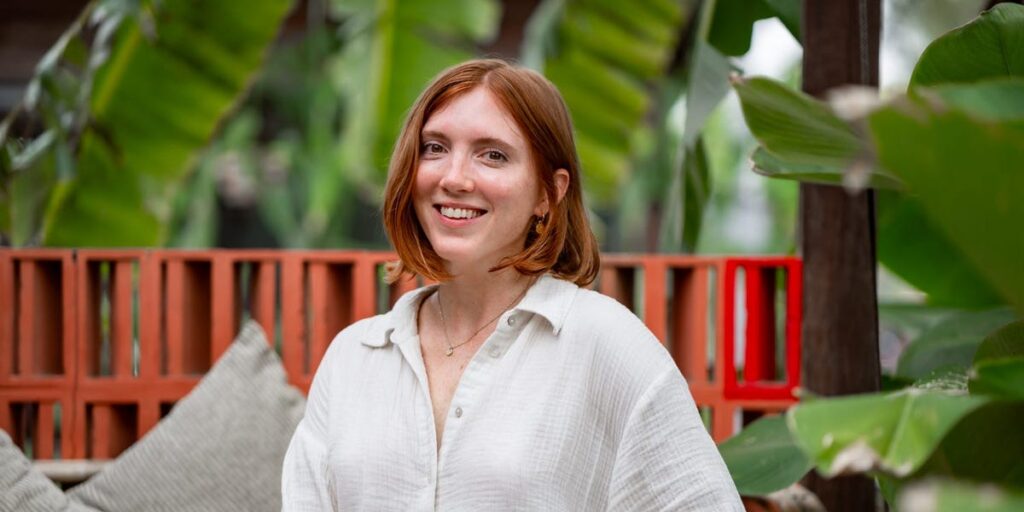This as-told-to essay is based on a conversation with Clara Davis, 38, the founder of Unravel, cofounder of Taste Collective in Shanghai, and Roots in Bali. Her words have been edited for length and clarity.
My parents, both lawyers, laid a path that seemed predetermined: law school followed by a stable corporate career.
After graduating from George Washington University with a bachelor’s degree in international relations, I became a paralegal at a law firm in DC. I thrived on the rigor, but often felt like I was playing dress-up as a lawyer in training — curious but not fully comfortable.
In 2010, I resigned from my paralegal job and moved to China to teach English in Chengdu. What was meant to be a one-year detour before law school turned into more than a decade in China.
During that time, I earned a dual master’s in global media and communications from the London School of Economics and Fudan University, and settled in Shanghai.
I founded Unravel, a storytelling platform, and later co-founded Taste Collective, a creative agency working with global food and beverage brands.
Time for a career pivot
Like for many others, the pandemic in 2020 forced a major reset as the world of experiential marketing and communal gatherings came to a halt. I faced serious questions about our business and future.
In early 2021, I visited my then-boyfriend (now husband and business partner) in Bali — what began as a short trip became the start of a new chapter.
Again, leaving the familiar behind was humbling. In Shanghai, I had an established identity; in Bali, I had to ask myself: Who am I here? What value can I create?
In 2022, we opened Roots, a neighborhood kitchen in one of Bali’s buzzing food districts. We run the restaurant with integrity — sourcing locally, reducing waste, and giving back through neighborhood events and local initiatives.
As a cofounder and operating partner, my role spans brand building, culinary development, and customer experience. I’ve been able to bring together everything I’ve learned about hospitality, people, and storytelling.
Earlier this year, I also helped launch The Hub, a coworking and co-living space for digital nomads and remote teams.
In terms of pace, Shanghai is electric, with big-city energy, constant motion, and an incredible rhythm to learn and grow as an entrepreneur. The ambition is contagious as China tends to attract a certain kind of person: curious, adaptable, and a little fearless.
Bali couldn’t be more different. I went from urban jungle to, quite literally, an actual jungle. There’s a real entrepreneurial energy across industries, and the food and beverage scene is impressively strong for such a “remote” island.
I’m certainly not less busy than I was in Shanghai; my days are just organized differently and have a bit more balance. Bali has softened my edges. It’s hard not to be influenced by a place that runs on ritual, rhythm, and a deep sense of presence.
Personal and professional obstacles
From a personal perspective, working alongside my husband has naturally blurred the lines between work and personal life. We come from different backgrounds and have very different personalities, which makes us complementary partners with distinct strengths.
We don’t always process challenges in the same way, but we share the same goals. Learning to navigate that balance has made us both better at what we do.
Relating to the business, the challenges are real: infrastructure, regulation, and waste management are all growing pains of a place developing so quickly.
There’s a lot to celebrate, but also plenty to question about how progress has helped versus hurt the island. It takes work and integrity to live and build responsibly here, and heart and intention matter, especially when top-down regulation moves more slowly or less uniformly than, say, in China, where policies were implemented swiftly, like it or not.
As with any business, building Roots required upfront investment, but more than that, and especially in hospitality, it demands time, energy, and patience. Running a restaurant is as much about perseverance as it is about passion, and while income can be less predictable, the freedom, ownership, and fulfillment it brings are worthy tradeoffs.
My journey has taught me that reinvention takes grit, vulnerability, and a willingness to embrace change. Living, working, and building outside your comfort zone makes you stronger, as a person and as a professional.
Today, Bali feels like the convergence of everything I’ve learned. It’s where I’ve slowed down enough to build with clarity, purpose, and integrity in business, partnership, and community. It feels good to be in a chapter that allows both continuity and change.
If China was the unexpected adventure that shaped my professional identity, Bali was the curveball I never saw coming — one that’s challenged and expanded me in many ways.
Do you have a story about moving to Asia that you want to share? Get in touch with the editor: akarplus@businessinsider.com.
Read the full article here


